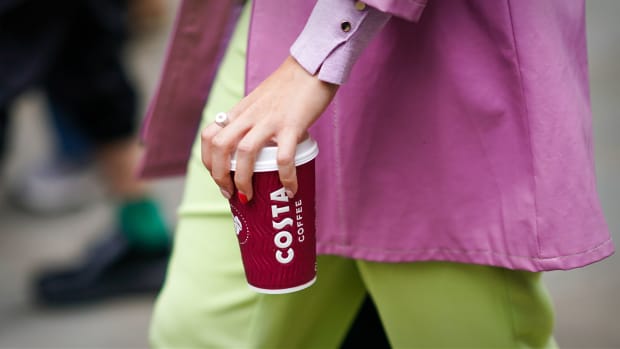
Coca-Cola has very little experience being the No. 2 brand.
In its core soft-drink offering, it dominates rival PepsiCo. (PEP). That has generally been the case across every major beverage category the company enters.
Except for coffee.
Coca-Cola (KO) does not own a major coffee brand in the U.S. What it does own is what some call the second-largest coffee-house chain in the world -- Costa Coffee -- and it also has a massive partnership with the actual second-largest coffee chain in the U.S. and the world, Dunkin'.
DON'T MISS: Coke Adds Coffee Giant Costa to Drinks Portfolio After $5 Billion Deal
While you can debate which brand takes the No. 2 slot -- it's Dunkin' by store count, Costa if you use a stricter definition of coffee house -- you can't debate that Starbucks (SBUX) leads the space in the U.S. and worldwide.
With more than 15,000 locations domestically and more than 30,000 globally, the chain dwarfs Dunkin' (11,000), Restaurant Brands International's (QSR) Tim Horton's (5,000), and Coke's own Costa (3,500).
The Atlanta giant thus has a tough time competing in coffee (outside of England, where Costa has about double the store count of Starbucks).
So instead of trying to disrupt the market leaders' cafe dominance, Coke is working to win market share from its rival in grocery and convenience stores, not with Costa, but through its other partner, Dunkin'.

Edward Berthelot/Getty Images
Coca-Cola Expands Its Dunkin' Line
Starbucks, through its global deal with Nestle (NSRGY), has a massive presence in grocery and convenience stores.
The chain has the entire range of ready-to-drink coffee: everything from black coffee in a bottle to canned coffee-based energy drinks to bottled Frappuccinos, cold brew cans, and slim cans filled with espresso-based drinks.
Dunkin' and Coca-Cola first partnered in 2017 to bring a line of bottled coffees to challenge Starbucks's ready-to-drink dominance. That was the coffee-and-doughnuts chain's first attempt to crack the grocery and convenience market.
Now, the two companies are expanding their relationship to broaden the Dunkin' ready-to-drink line into cans. Coca-Cola has already delivered a new line to its retail partners, named the Dunkin’ Iced Coffee Bakery Series. The beverage lineup includes three unique flavors exclusive to Dunkin’, including Brownie Batter Donut, Cake Batter Donut and Coffee Cake Muffin.
"Inspired by the beloved bakery items available at Dunkin’, this new ready-to-drink iced coffee blends the best of both worlds, bringing coffee lovers the opportunity to sip their bakery favorites and receive a sweet delight, anytime and anywhere," Dunkin' said in a news release.
The new drinks mark Dunkin's first canned ready-to-drink beverages. All three flavors are being sold in 11-ounce cans and the company says they are best served chilled. Made by Coca-Cola, the new drinks combine Dunkin’s signature iced coffee with milk and cane sugar.
Global Coffee Sales Are Climbing
Coca-Cola has not made any moves to bring Costa cafes to the U.S., possibly because of the covid pandemic. The company had vague plans to bring the chain to its home market when it made the purchase in 2019. But it certainly wasn't going to do that during virus-related lockdowns, and the sensible move would be to wait before an expansion of that magnitude.
At the same time it's easy to see why Coke wants a bigger piece of the global market for coffee. That market has steadily grown (except for a covid-related dip in 2020) climbing 25% to $433 billion in 2023 from $346 billion in 2012, according to data from Statista.
In terms of liquid-beverage equivalents, coffee is among the most consumed beverages worldwide with roughly 42.6 liters (11.25 gallons) per person per year (12.6 liters of roast coffee and 30 liters of instant coffee), the website said.
"...Value sales of coffee have been propelled in recent years by the out-of-home sector, which is more relevant in this segment than in many other drinks categories," it said. "Another trend is the redefinition of coffee from a common means of caffeination to a sensual experience, which has driven premiumization."
Related Links:







